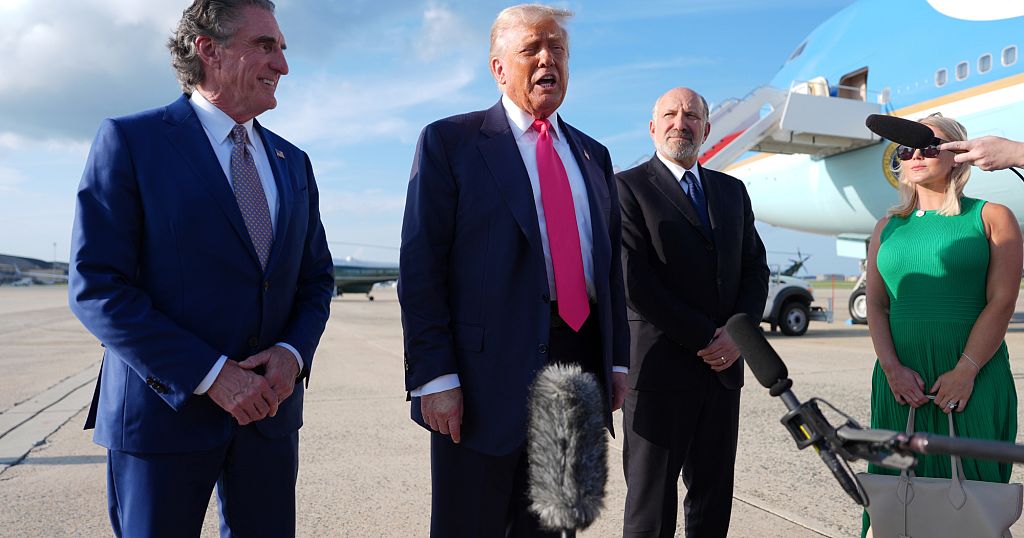US Travel Sector Boils Over as New Severe Weather Chaos Sparks Massive Flight Disruption, Impacting Trips from Canada, Mexico, Brazil, Argentina, and Caribbean Amid Tourism Declines and Tariff Tensions - Travel And Tour World
Wednesday, July 16, 2025

US travel sector boils over as new severe weather chaos sparks massive flight disruptions, impacting trips from Canada, Mexico, Brazil, Argentina, US, and the Caribbean amid tourism declines and tariff tensions. Over recent days, powerful storms triggering thousands of flight cancellations and delays have deepened existing economic woes for the US travel industry, already reeling from sharp drops in international visitors driven by ongoing political disputes, rising tariffs, and travel boycotts. With major aviation hubs such as JFK, Newark, LaGuardia, Atlanta, Dallas-Fort Worth, Chicago O’Hare, Orlando, Denver, and Reagan National facing unprecedented weather-induced turmoil, travelers from key markets including Canada, Mexico, Brazil, Argentina, the Caribbean, as well as domestic passengers, have found themselves stranded and increasingly frustrated, compounding fears about lasting damage to America’s global tourism reputation.
The US travel sector is in unprecedented chaos as severe weather ignited widespread disruptions, canceling thousands of flights within major US airports in the past week. Severe thunderstorms, heavy winds, heavy rains, and sudden flash flooding closed major aviation centers such as JFK, Newark, LaGuardia, Chicago O’Hare, Dallas-Fort Worth, Atlanta Hartsfield-Jackson, Orlando, Denver, and Reagan National. In the past week, this weather chaos itself caused over 12,000 flight disruptions across the country, leaving thousands of travelers stranded at airports, hotels, and cities away from home.
At Newark Liberty alone, storm fury resulted in 150 delays and 173 cancellations. The same was not spared at LaGuardia Airport, with 185 delays and 79 cancellations being recorded, with JFK reporting similarly, with 293 delays and 45 cancellations. Severe weather at Atlanta’s Hartsfield-Jackson resulted in 37 groundings of flights and 326 flight delays. Other major airports, including Chicago O’Hare and Dallas-Fort Worth, reported similarly, with mass cancellations and delays, shutting down travel facilities and causing outrage among thousands of travelers.
Already reluctant with sharply falling travel patterns to the US, Canadian tourists were acutely affected by these disruptions. Canadian flight journeys to the US dipped nearly 22% year-over-year as transnational tourism dived sharply due to increased political tensions, adverse exchange rates, new tariffs, and burgeoning consumer boycotts. Canadian road trips to the US as a whole fell by some 33% in recent months, highlighting growing hesitation among Canada’s otherwise consistent US-bound travelers.
With Canadian travelers already cutting back, disruptions caused by severe weather further dampened moods. Airlines operating on Canadian routes—Air Canada, Jazz Aviation, WestJet, and Porter Airlines—together saw nearly 50 combined cancellations and delays, leaving hundreds of passengers stranded and stoking discontent at a time of already sensitive bilateral travel flows.
Even travel out of Mexico, Brazil, and Argentina was disrupted under these massive disruptions. Air travelers on Mexican carriers Aeroméxico, VivaAerobus, as well as Volaris, had delays across crucial US gateways such as Dallas-Fort Worth as well as Orlando. Brazilian as well as Argentinian carriers, while experiencing no immediate cancellations under this storm phenomenon, had enormous indirect impacts with transfer flights as well as networks coming under delay, compromising entire passenger itineraries as well as consumer satisfaction.
Brazilian travelers now face a fresh wave of disruption—a possible 50% US-caused tariffs on some Brazilian imports, further chilling economic sentiment and risking greater declines in US-Brazil tourism exchanges. Mexico, with similar threats of tariff rates of up to 30%, anticipates greater hesitation among its travelers planning future US trips, with recovery challenging in the wake of such disruptions.
Caribbean nationals also grappled, as essential routes through primary US gateways suddenly suspended. With carriers as Caribbean Airlines and interCaribbean Airways significantly dependent on routes through Miami, New York, and Atlanta, thousands of Caribbean travelers suddenly got stranded at US airports or had to forego travel plans altogether.
U.S. travelers encountered similar frustrating weather, in addition to already low domestic travel sentiment. The disruptions struck especially in peak summer vacation weeks, disrupting itineraries and costing carriers, airports, hotels, and related businesses millions in lost revenues. Large U.S. carriers—United Airlines, American Airlines, Delta, JetBlue, and Southwest—all encountered massive cancellations and delays, continuing to damage customer confidence at a difficult economic time.
The latest disruptions exacerbate broader economic challenges facing the US travel industry. Tourism to America is already projected to fall dramatically in 2025, with global traveler sentiment souring due to tariff tensions and ongoing geopolitical unease. International visitor spending in the US is expected to decline by approximately $12.5 billion this year alone, reflecting growing global dissatisfaction with travel experiences, economic conditions, and border-related political tensions.
Canada-US tariff tensions sum up this economic agitation: planned 35% levies on most of Canada’s exports, due from August 2025, threaten economic relations between these two otherwise tightly-coordinated neighbors. Retaliatory duties have been warned of by Canada, further rattling consumer confidence in transborder commerce as well as chilling tourism traffic between both countries.
Likewise, US plans of levying tariffs on Mexican and Brazilian imports further aggravate fears of an expanding trade war, in turn dampening already waning tourism trends originating from these large visitor markets.
Traditionally Canada’s biggest provider of world travellers in the US, Canadian visits have significantly declined in recent months. According to reports in Statistics Canada, Canadian air visits in June 2025 fell and only contributed to just a small tally of , recording an accelerating slump. Even steeper, road visits by Canadians in the US fell around , recording a sixth consecutive month of dramatic falls. Such a long-term slump has been attributed to increased political tension, economic uncertainty, as well as the huge impact of newly levied tariffs. An Angus Reid poll further emphasizes this change of heart, reporting had cancelled or contemplated cancelling future US visits, registering growing reluctance towards visiting America.
Latin American tourism, consisting of Mexico, Brazil, and Argentina, among others, has seen some significant declines as well. Mexican arrivals have decreased significantly, with current statistics reporting in recent months visiting the US than in past years. Brazilian travelers have seen growing reservations with planned tariffs of up to on Brazilian exports, raising concern among travel operators of an even greater tourism decline from Latin America’s biggest market. Argentina itself has thus far not been explicitly referenced with final tariff rates, but general South American visitor statistics fell roughly year-over-year at the start of 2025, showing general region-wide reservations towards visiting the US.
Caribbean citizens have likewise exhibited dampened interest in visits to the US. Visitors from island countries such as Jamaica, the Bahamas, and Barbados, who are again frequent goers to Florida, New York, and other favorite US havens, have increasingly become hesitant as a result of financial pressures as travel expenses as well as trade levies escalate. Caribbean travel agencies have recorded lower bookings, some attributing reluctance to border entry challenges, economic concerns, as well as general circumspection ignited by rising geopolitical tensions.
Beyond the Western Hemisphere, general overseas travel to the US is expected to fall significantly in 2025. Foreign visits throughout the nation dropped by some year on year in early 2025, one of the steepest non-pandemic drops in modern history. Europe’s largest tourism markets—the UK, France, and Germany—specifically registered drops of between , primarily led by US tariff threats along with diplomatic tension. Accordingly, there will be large economic consequences expected with an estimated loss of as much as in overseas visitor spend in 2025 alone, with huge economic risk among large US tourism-dependent cities as well as among states.
The sudden slump in tourism is already costing direct economic damage, primarily in tourism-reliant cities like Orlando, Las Vegas, and New York. Florida is set to lose as many as in 2025, a slump set to cost as much as . Duty-free shop sales at border zones have also dipped by as much as , with direct implications on employment as well as businesses of inbound international tourists. Should trends continue as they have, industry analysts caution, the tourism slump could have a devastating impact on economic hardship throughout hospitality, retail, airline, as well as related businesses, with thousands of US jobs at risk.
Industry officials and tourism stakeholders have been increasingly emphatic, demanding immediate policy interventions in response to downward tourism trends. Transparent communication regarding tariffs, streamlined visa and entry-border procedures, and positive marketing of the US as a friendly tourism hub have been identified as necessary measures in halting further declines. In the absence of strategic interventions, there is potential long-term erosion of the US’s world tourism image, diluting its otherwise sound tourism economy and loss of visitor market share in favor of increasingly friendly overseas tourism sites.
You can seamlessly include these paragraphs in your current writing right after discussing flight cancellations, undoubtedly transitioning into broader tourism decline narratives. These paragraphs include necessary background, difficult statistics, along with economic impact working perfectly with your headline as well as your initial argument.
As the immediate severe weather crisis eases, the US travel sector faces significant hurdles to recovery. Industry experts warn of lasting repercussions from these disruptions—loss of consumer trust, a deepening tourism decline, and an uncertain future clouded by tariff threats and political tensions. Airports and airlines now grapple not only with operational recovery but also with urgent tasks of rebuilding traveler confidence and adapting to a rapidly changing global travel landscape. In the midst of chaos, travel companies demand policy direction, increased consumer protections, and concerted governmental reactions in hopes of avoiding similar mass disruptions. In the meantime, US destinations prepare for potential further economic damage as long as tourism remains in a downward trajectory. Without specialized recovery initiatives, commentators state, America’s status as one of the greatest travel destinations in the world will further slip away, significantly altering world travel directions permanently as well as significantly influencing the US-based economy for years to come.
You may also like...
Diddy's Legal Troubles & Racketeering Trial

Music mogul Sean 'Diddy' Combs was acquitted of sex trafficking and racketeering charges but convicted on transportation...
Thomas Partey Faces Rape & Sexual Assault Charges

Former Arsenal midfielder Thomas Partey has been formally charged with multiple counts of rape and sexual assault by UK ...
Nigeria Universities Changes Admission Policies

JAMB has clarified its admission policies, rectifying a student's status, reiterating the necessity of its Central Admis...
Ghana's Economic Reforms & Gold Sector Initiatives

Ghana is undertaking a comprehensive economic overhaul with President John Dramani Mahama's 24-Hour Economy and Accelera...
WAFCON 2024 African Women's Football Tournament

The 2024 Women's Africa Cup of Nations opened with thrilling matches, seeing Nigeria's Super Falcons secure a dominant 3...
Emergence & Dynamics of Nigeria's ADC Coalition

A new opposition coalition, led by the African Democratic Congress (ADC), is emerging to challenge President Bola Ahmed ...
Demise of Olubadan of Ibadanland
Oba Owolabi Olakulehin, the 43rd Olubadan of Ibadanland, has died at 90, concluding a life of distinguished service in t...
Death of Nigerian Goalkeeping Legend Peter Rufai

Nigerian football mourns the death of legendary Super Eagles goalkeeper Peter Rufai, who passed away at 61. Known as 'Do...




:max_bytes(150000):strip_icc()/071525-wedding-attire-soc-a017679ee83b4bafb368042cda1dfe1d.jpg)